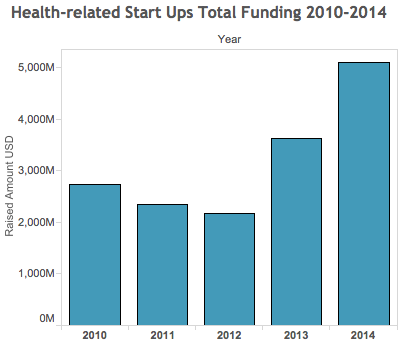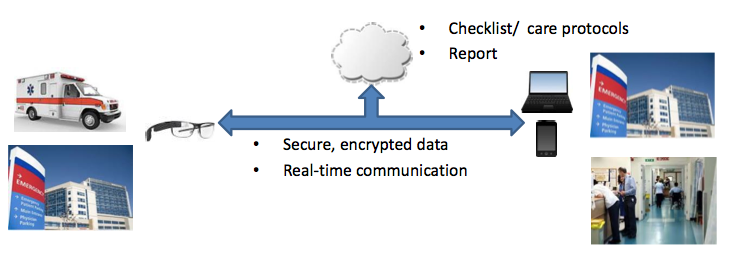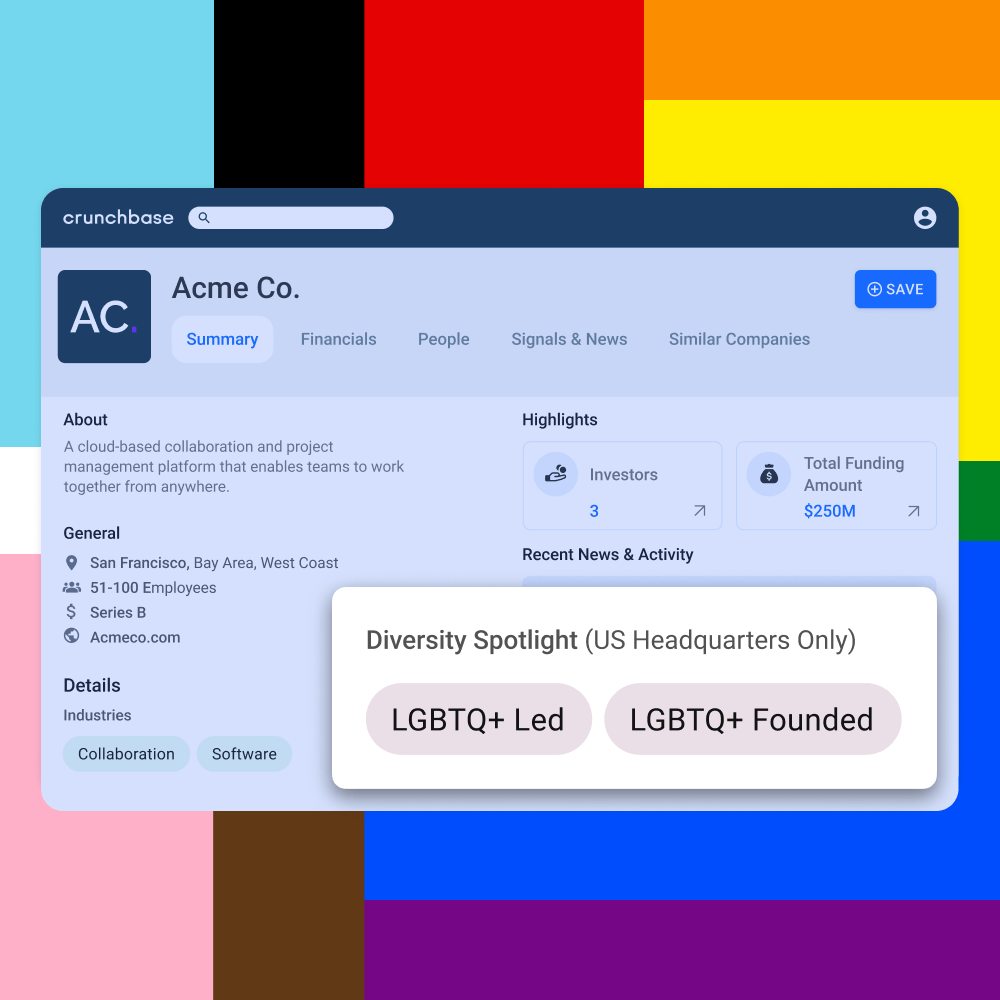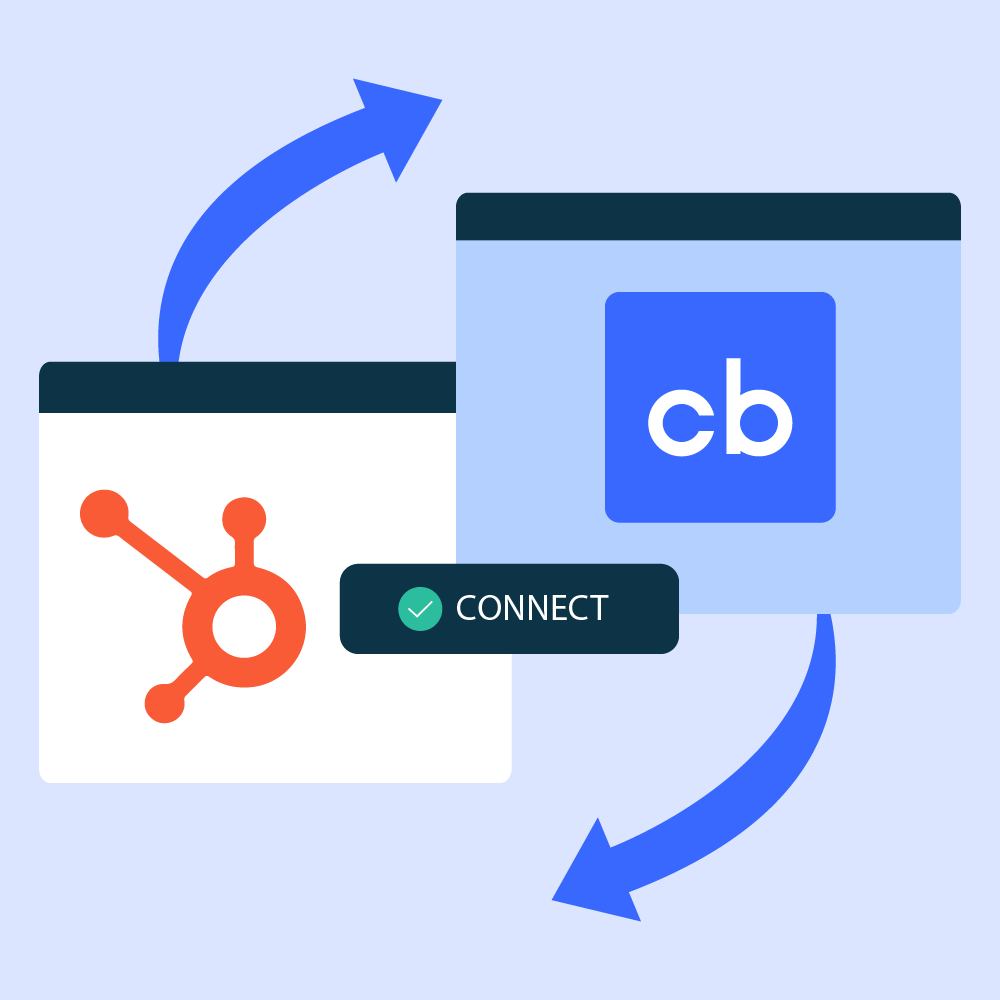When Google Glass was announced, outcries of invasion of privacy were inevitable. With its capability to discretely take photos and record video, the concern was and is still very real. The device has been banned in multiple locations throughout Silicon Valley.
Google Glass may never be publicly accepted, but does this make Google Glass a failure? Not yet. Recent investments and new startups indicate a growing interest towards Google Glass in healthcare. The North American Healthcare IT market was $21.9 billion in 2012 and will grow to $31.3 billion by 2017.
Yesterday, Pristine.io, a Google Glass telehealth startup, announced a $5.4 million Series A from S3 Ventures. This brings Pristine.io’s funding total to $6.2 million in combination with previous investments from Onevest and Capital Factory.
According to CrunchBase, health-related startups received $3.6 billion in 2013 and $5.1 billion in 2014, which is a 40% increase and Q4 of 2014 has not started.
The two main medical areas being researched with Google Glass are hands free documentation and telemedicine.
Augmedix, arguably the largest Google Glass health startup, specializes in hands free documentation/information and received $7.3 million in June 2014. Augmedix is active in three national health systems, one of which was announced – Dignity Health – as well as other smaller clinics. According to CEO & Founder Ian Shakil, Augmedix will close an even larger round by Jan 2015. First round investors include DCM, Rock Health, Great Oaks Venture Capital, Emergence Capital Partners, OVO Fund, Lifeforce Ventures, Scott Bannister, Lyle Dennis, and Sami Inkinen.
Hands free documentation means everything said, heard, and seen by Google Glass will automatically be recorded to your medical chart, which will be available to the physician at any time. Privacy and safety concerns are addressed as software must be HIPAA-compliant. According to Shakil, Google Glass “will save doctors 1/3 of the day that they would otherwise spend on EHR [electronic health records] work.”
Telemedicine aka telehealth is using a device like Google Glass to live stream what is currently being seen by medical response personnel to a remote physician, hospital, or specialist. Why Google Glass and not other technologies? Dan Herbstman, CEO & Co-founder of Third Eye Health, believes, “Google Glass is the furthest along in offering a true head-up-display that a health care provider can use to review, share and document information as he or she uses his or her head and hands to assess and treat patients.”
Third Eye Health has raised $50k from the Healthbox Chicago program. TEH researches telemedicine using Google Glass and other wearable technologies.
The ability to act on a patient a few minutes early will save thousands of lives. The telemedicine market alone is estimated to grow to $4.5 billion by 2018. However, Telemedicine is currently expensive and has many barriers as seen in Intouch Health’s research paper.
How easy or hard it would be to get medical professionals to use Google Glass? Carl Spitzer MD & CEO of Healium, a documentation-based Google Glass startup, suspects that “Medical professionals will use anything that makes their work life easier. It’s really that simple. Save me time, make the information I need easy to access, and I’m there.” Spitzer makes it apparent that physicians will use new technology, but will patients approve of it? Shakil reports a “99% acceptance (patients) across the nation. This is seen with a high N-size in North Carolina, Texas, Arizona, and California.”
With Google Glass at $1500 and pricy enterprise software, how would this affect medical bills? Dr. Spitzer assured me that the current “$1500 price tag of Glass (which will certainly drop over time), plus the cost of software, is easily absorbed when one considers the significantly increased provider efficiency, and improvements in quality of care that comes from real-time access to critical information.”
So which startups have the head start? Augmedix, Pristine.io, and Wearable Intelligence currently have the most funding.
Wearable Intelligence raised $7.9 million in August 2014 from Andreessen Horowitz, KPCB Holdings, Google Ventures, Subtracted Capital, Initialized Capital, and First Round Capital. The San Francisco-based company researches Google Glass for documentation, telemedicine, and information.
CrunchBase shows that the following investors have been investing the most in health-related startups in 2014.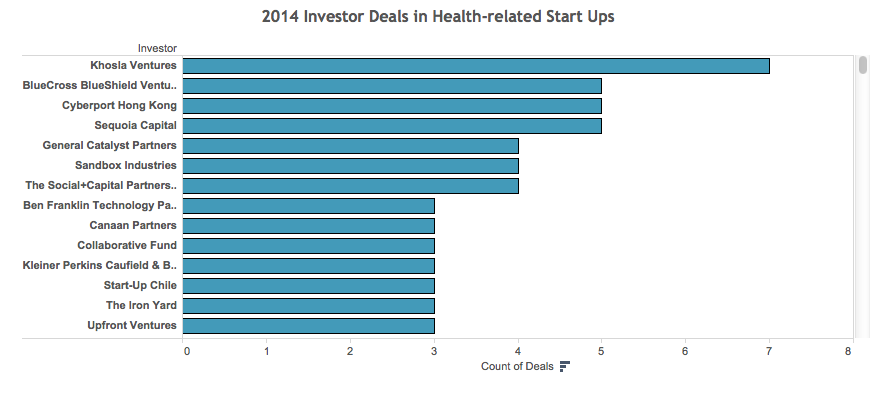

Khosla Venture leads with 7 investments followed by Bluecross Blueshield Ventures, Cyberport Hong Kong, and Sequoia Capital with 5.
Google Glass Startups that are currently looking for funding are Healium and Context Surgery. Context Surgery mentioned that they are looking for funding via AngelList while Healium founders are also fundraising publicly and are also open to questions/emails (see below). Other medical Google Glass related startups in CrunchBase are Twiage and Remedy.
Special Thanks to:
- Carl Spitzer, MD CEO & Co-Founder of Healium (carl.spitzer@healium.com)
- Craig Rosenberg, PhD CTO & Co-Founder of Healium (craig.rosenberg@healium.com)
- Ian Shakil, CEO & Founder of Augmedix
- Dan Herbstman, CEO & Founder of Third Eye Health
- Photo Credits: Context Surgery, Third Eye Health, Healium

